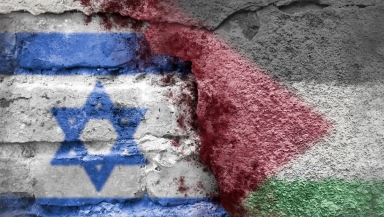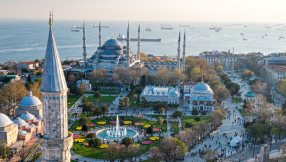
On 9 October a statement was issued by the Bishop of Southwark, Christopher Chessun, the Church of England’s lead bishop for the Middle East, together with the Bishops of Chelmsford, Gloucester and Norwich, about the agreement for a ceasefire in Gaza. In this statement the bishops declared:
‘A credible peace must start with a ceasefire, but it will not last without a fundamental shift in the attitudes and behaviours that, for too long, have maintained Israel’s occupation of Palestinian territory and thwarted Palestinian self-determination and statehood. The settler violence in the West Bank must cease and the settlement-expansion programme must be reversed.’
It then adds: ‘We continue to hold that the only path to a just peace for Israelis and Palestinians, is a two-state solution that provides for a safe and secure Israel alongside a viable and sovereign Palestinian state.’
What is quite astonishing is that the onus for achieving a lasting peace rests wholly with Israel. The only people whose attitudes must change are the Israelis. They must abandon ‘the attitudes and behaviours that, for too long, have maintained Israel’s occupation of Palestinian territory and thwarted Palestinian self-determination and statehood.’
However, as the historian Ephraim Karsh shows in detail in his book Palestine Betrayed, it has not been the attitudes and behaviour of Israel that have historically prevented the Palestinian Arabs living in peace in a state of their own. They were offered their own state alongside Israel by the British in 1937, by the United Nations in 1947, and by the Israeli Prime Ministers Yitzhak Rabin, Ehud Barak, Ehud Olmert and Benjamin Netenyahu in 1993, 2000, 2007, and 2009. In addition, the Palestinian population in Gaza were given the opportunity for complete self-government after Israel’s total withdrawal from Gaza in 2005.
However, on each of these occasions the Palestinian leaders, Hajj Amin Husseini, Yasir Arafat, Mahmoud Abbas and the collective leadership of Hamas rejected the opportunity for a lasting peace that was being offered to the Palestinian people.
If we ask why they have been unwilling to accept these peace offers the answer is given in the Palestinian National Charter of 1968 and Hamas Covenant of 1988, neither of which have been subsequently abrogated or altered. They are worth quoting at length here in order to understand the full picture.
Firstly, the Palestinian National Charter declares in Article 8 that the current phase of the history of the Palestinian people ‘is that of national (watani) struggle for the liberation of Palestine’.
‘Thus, the conflicts among the Palestinian national forces are secondary, and should be ended for the sake of the basic conflict that exists between the forces of Zionism and of imperialism on the one hand, and the Palestinian Arab people on the other,’ it reads.
‘On this basis the Palestinian masses, regardless of whether they are residing in the national homeland or in diaspora (mahajir) constitute - both their organizations and the individuals - one national front working for the retrieval of Palestine and its liberation through armed struggle.’
Article 9 states that ‘armed struggle is the only way to liberate Palestine’ and that this is ‘the overall strategy, not merely a tactical phase’.
‘The Palestinian Arab people assert their absolute determination and firm resolution to continue their armed struggle and to work for an armed popular revolution for the liberation of their country and their return to it. They also assert their right to normal life in Palestine and to exercise their right to self-determination and sovereignty over it,’ it says.
Article 15 then states that the ‘liberation of Palestine’ is a ‘national (qawmi) duty’ and that ‘it attempts to repel the Zionist and imperialist aggression against the Arab homeland, and aims at the elimination of Zionism in Palestine’.
It goes on: ‘Absolute responsibility for this falls upon the Arab nation - peoples and governments - with the Arab people of Palestine in the vanguard. Accordingly, the Arab nation must mobilize all its military, human, moral, and spiritual capabilities to participate actively with the Palestinian people in the liberation of Palestine. It must, particularly in the phase of the armed Palestinian revolution, offer and furnish the Palestinian people with all possible help, and material and human support, and make available to them the means and opportunities that will enable them to continue to carry out their leading role in the armed revolution, until they liberate their homeland.’
The Hamas Covenant states in Article Eleven that: ‘The Islamic Resistance Movement believes that the land of Palestine is an Islamic Waqf consecrated for future Moslem generations until Judgement Day. It, or any part of it, should not be squandered: it, or any part of it, should not be given up. Neither a single Arab country nor all Arab countries, neither any king or president, nor all the kings and presidents, neither any organization nor all of them, be they Palestinian or Arab, possess the right to do that. Palestine is an Islamic Waqf land consecrated for Moslem generations until Judgement Day. This being so, who could claim to have the right to represent Moslem generations till Judgement Day? … This Waqf remains as long as earth and heaven remain. Any procedure in contradiction to Islamic Sharia, where Palestine is concerned, is null and void.’
Article Thirteen rejects ‘so-called peaceful solutions and international conferences’ as being ‘in contradiction to the principles of the Islamic Resistance Movement' and not ‘capable of realising the demands, restoring the rights or doing justice to the oppressed’.
Furthermore, they are ‘only ways of setting the infidels in the land of the Moslems as arbitrators … There is no solution for the Palestinian question except through Jihad. Initiatives, proposals and international conferences are all a waste of time and vain endeavours. The Palestinian people know better than to consent to having their future, rights and fate toyed with.’
While the Palestinian National Charter uses the language of secular Arab nationalism and the Hamas Covenant uses the language of Islamic theology, they both put forward the same basic idea. The whole of Mandate Palestine, ‘from the river to the sea,’ is Palestinian and Muslim territory and it is the duty of all Palestinians to seek to liberate Palestine by force.
Furthermore, in addition to the Palestinian rejection of Israel’s existence, its existence is also rejected by Iran and its Lebanese and Yemeni proxies, Hezbollah and the Houthis. They reject the existence of Israel on the grounds that it is a Western colonial project occupying Islamic land, and in addition Iran’s leaders also hold a form of Shiite Islamic eschatology in which the Mahdi (the Shiite version of the Messiah) will appear to rule the world on behalf of Islam only after the Islamic world destroys Israel. To people in the West this belief may appear completely bizarre, but the Iranian leadership are entirely serious about it.
What also needs to be understood is that the view of the world just outlined is what is still presented in the media by the Palestinian Authority, Hamas, and by Iran and its proxies, and is what is being taught to Palestinian children and young people. For the evidence for this see the websites Palestine Media Watch and Middle East Media Research Institute.
All this means that the bishops’ suggestion that if only the Israelis would change their attitudes and behaviour, and stop settlement activity in the West Bank, the way to peace would be opened up is completely misleading.
The major roadblock on the way to peace is the fact that the Palestinian leadership and the Iranians and their proxies do not currently want a two-state solution any more than they have wanted it at the times when it has been offered from 1937 onwards.
What they want is a single Palestinian Islamic state covering the whole area from the Jordan to the Mediterranean built upon the ruins of the state of Israel and the death, expulsion, or subjugation of its Jewish inhabitants. If Israel were to withdraw from the West Bank and cede it to Palestinian control tomorrow all the evidence we have indicates that, as happened with Gaza, the ceded territory would simply be used for further attacks on Israel.
None of this means that peace in the Middle East is impossible. As Jesus said, ‘With God all things are possible’ (Matthew 19:26). What it does mean is that peace will only happen once there is a radical change in the thinking of the Palestinians and of Iran and its proxies. Christians need to pray and work for this change to happen, but they must first of all recognise that this change is needed. Statements like those from the four bishops are deeply unhelpful in this regard.













